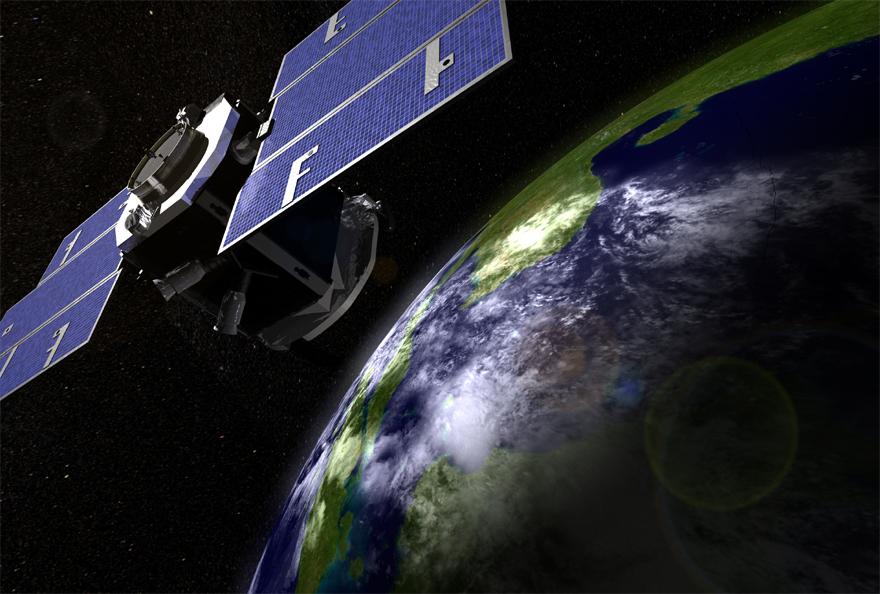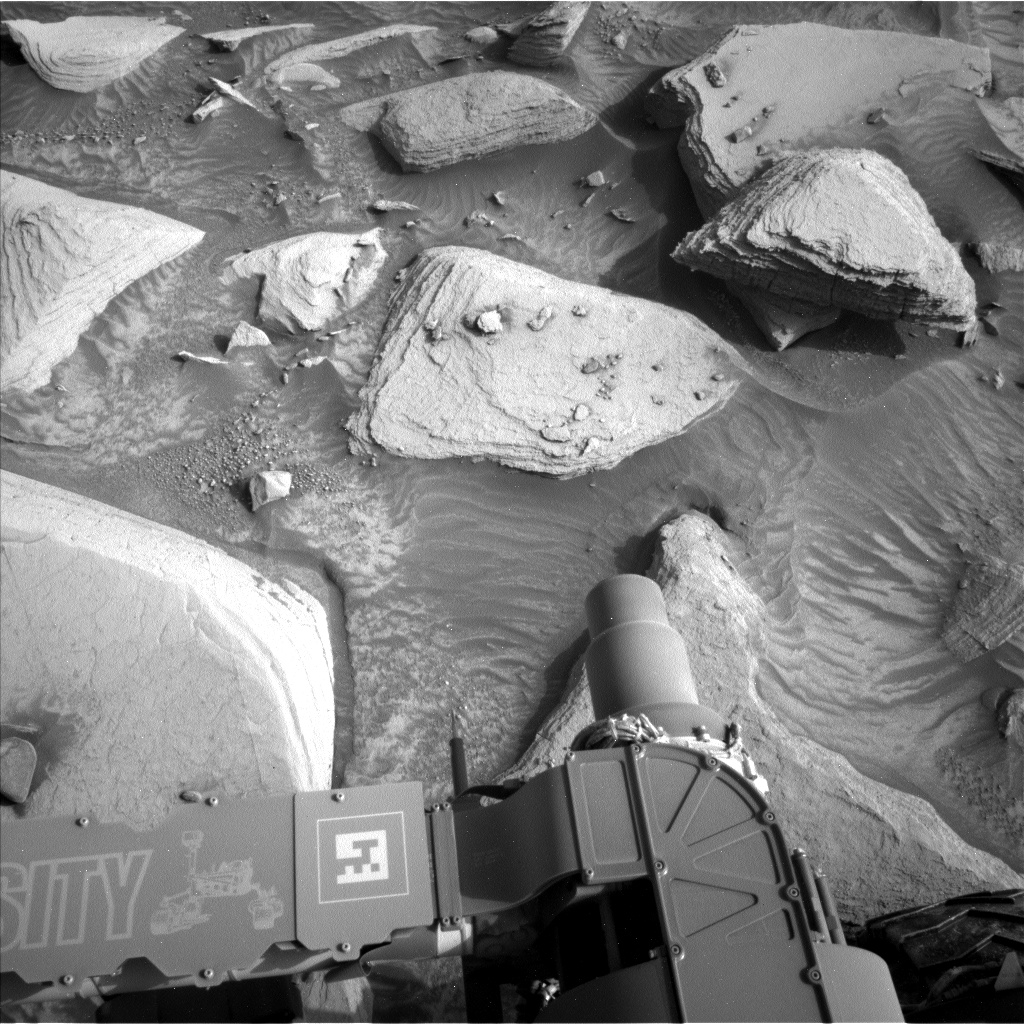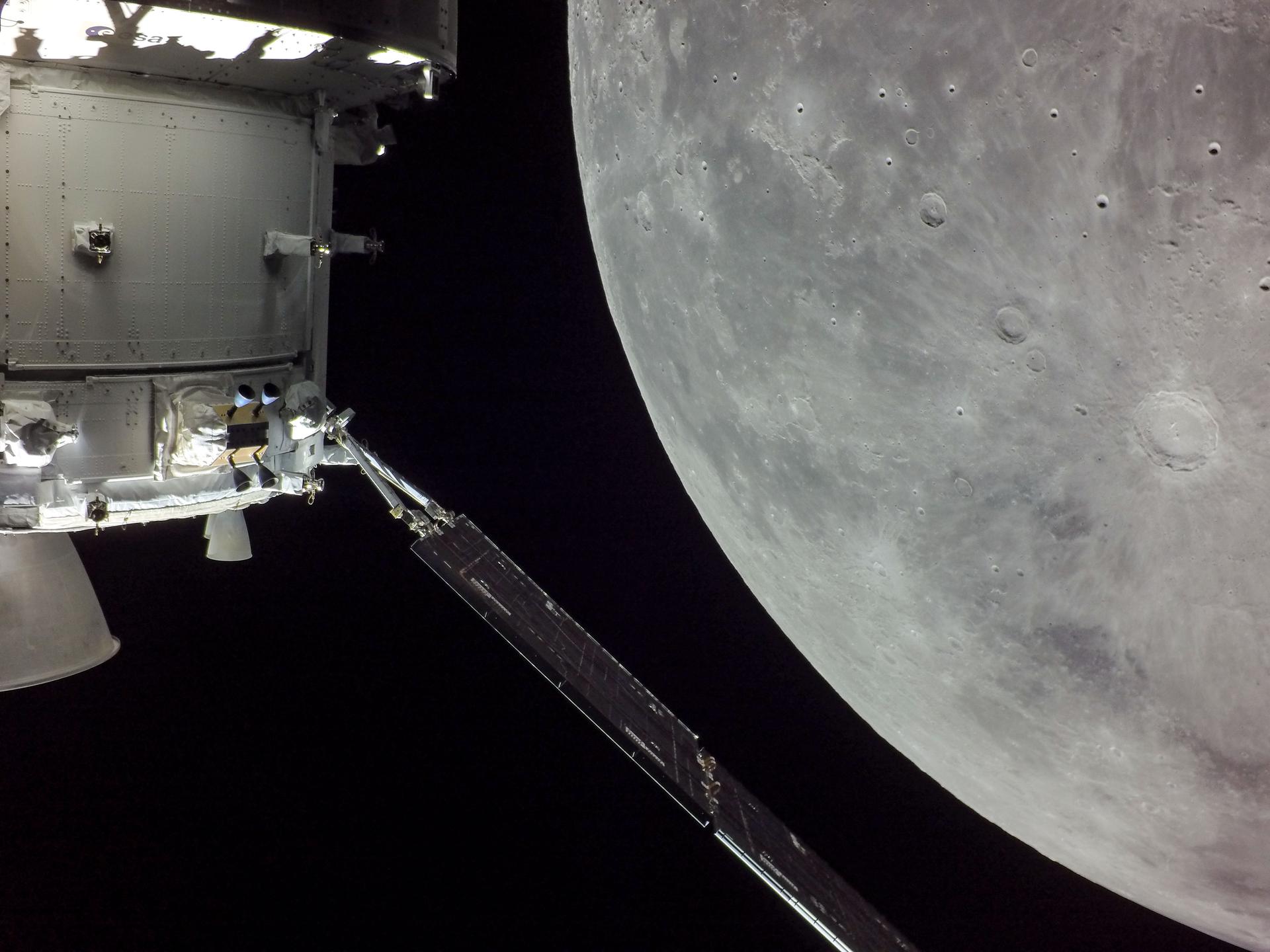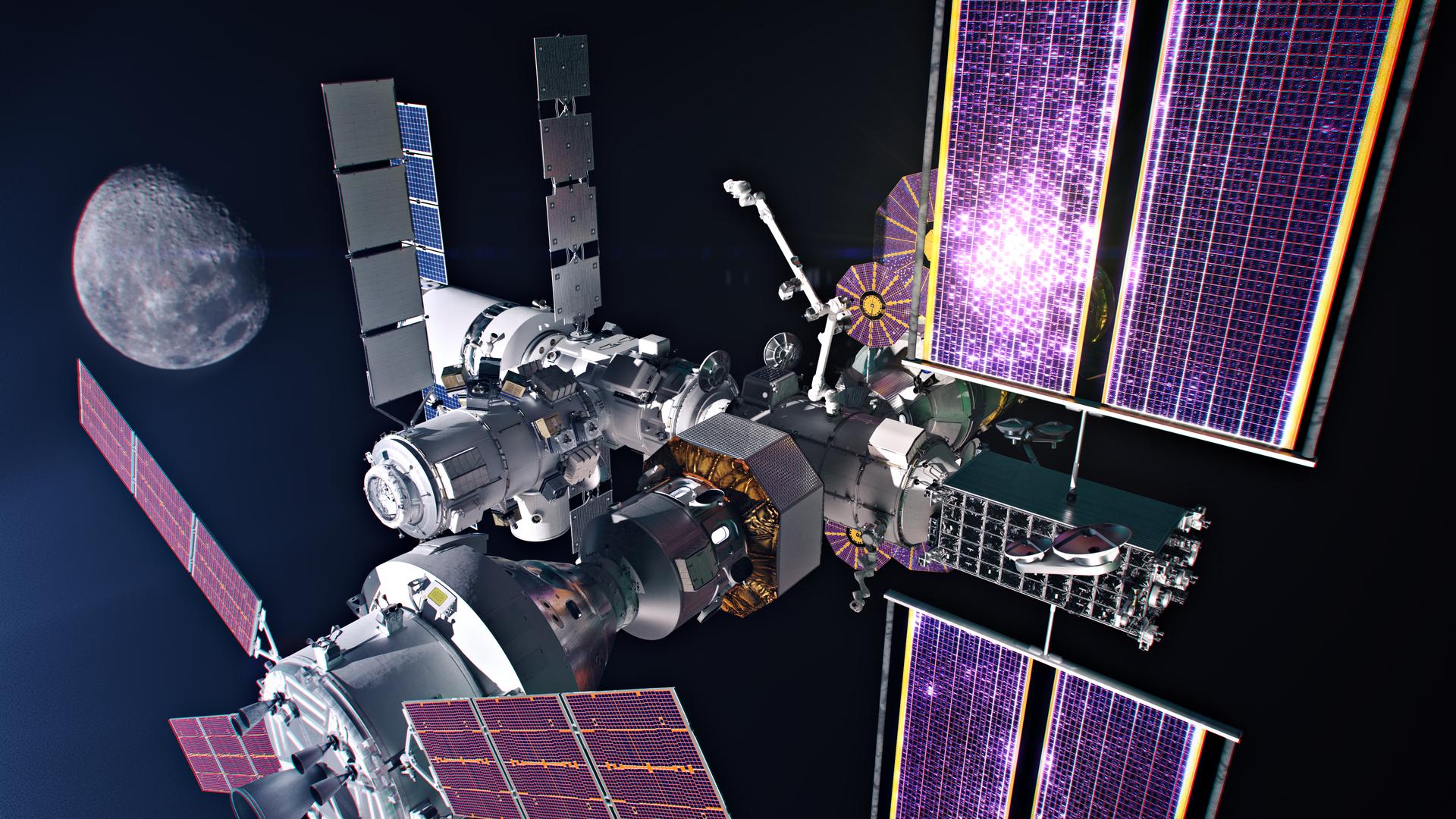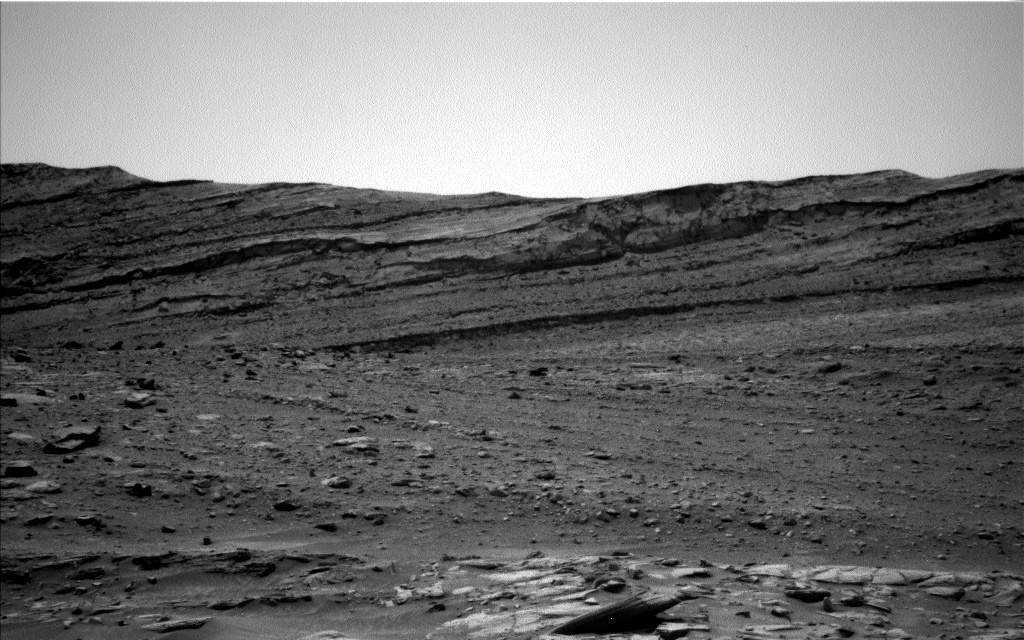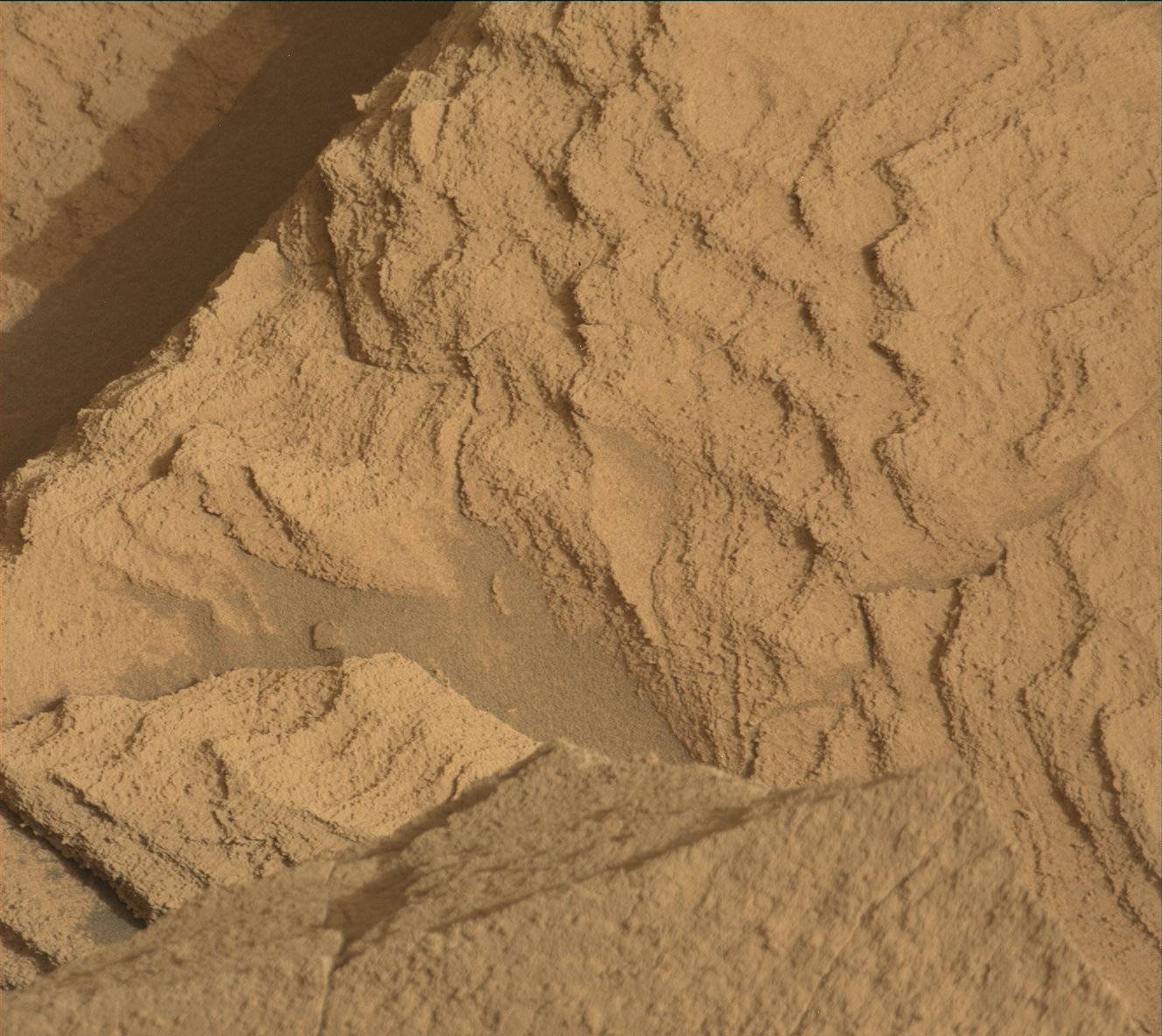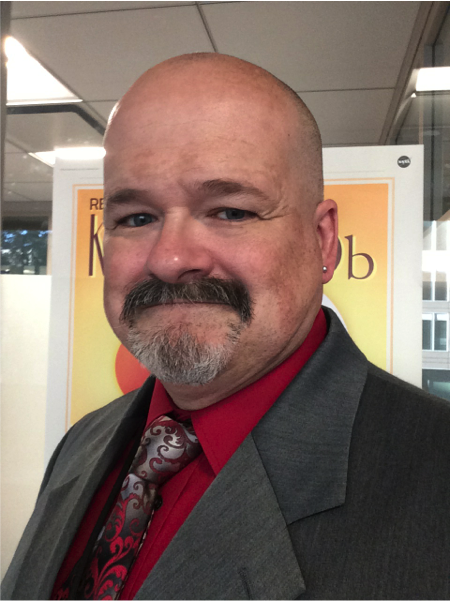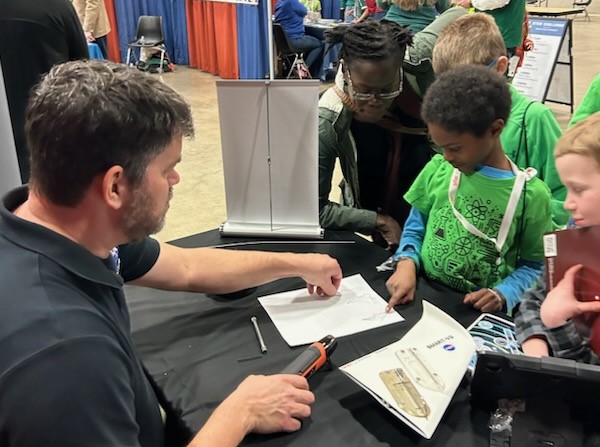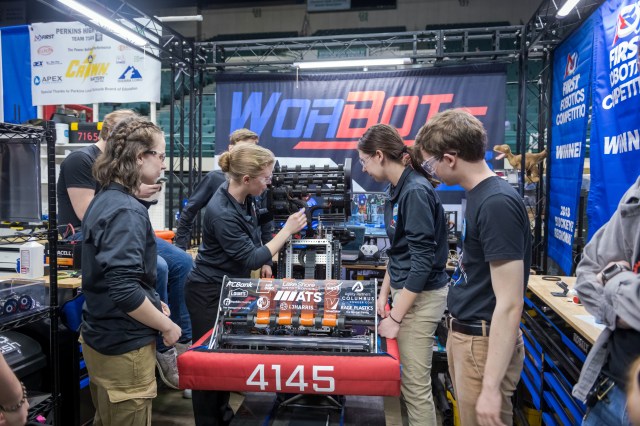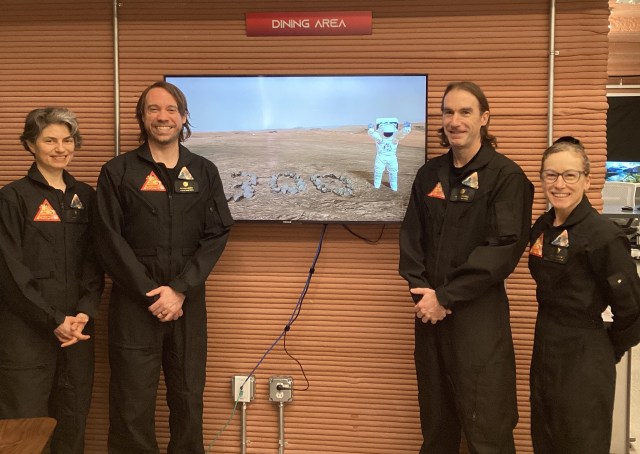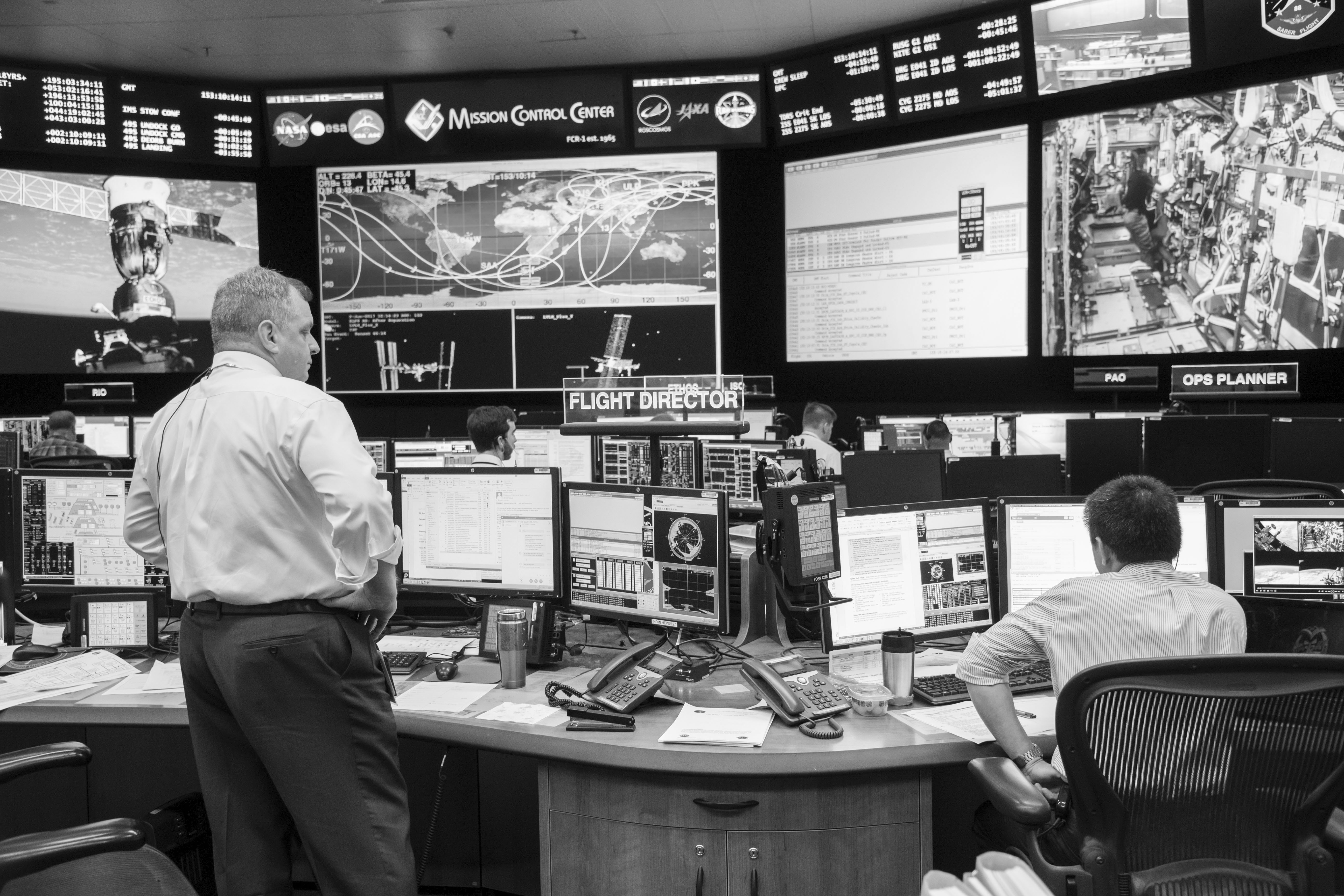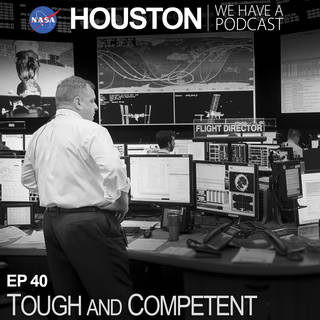
“Houston We Have a Podcast” is the official podcast of the NASA Johnson Space Center, the home of human spaceflight, stationed in Houston, Texas. We bring space right to you! On this podcast, you’ll learn from some of the brightest minds of America’s space agency as they discuss topics in engineering, science, technology and more. You’ll hear firsthand from astronauts what it’s like to launch atop a rocket, live in space and re-enter the Earth’s atmosphere. And you’ll listen in to the more human side of space as our guests tell stories of behind-the-scenes moments never heard before.
Episode 40 features Colonel TJ Creamer who shares his story from humble beginnings in the military to tweeting from the International Space Station. Creamer describes his transition as the first and only individual to be both an astronaut and a flight director. This episode was recorded on March 29, 2018.
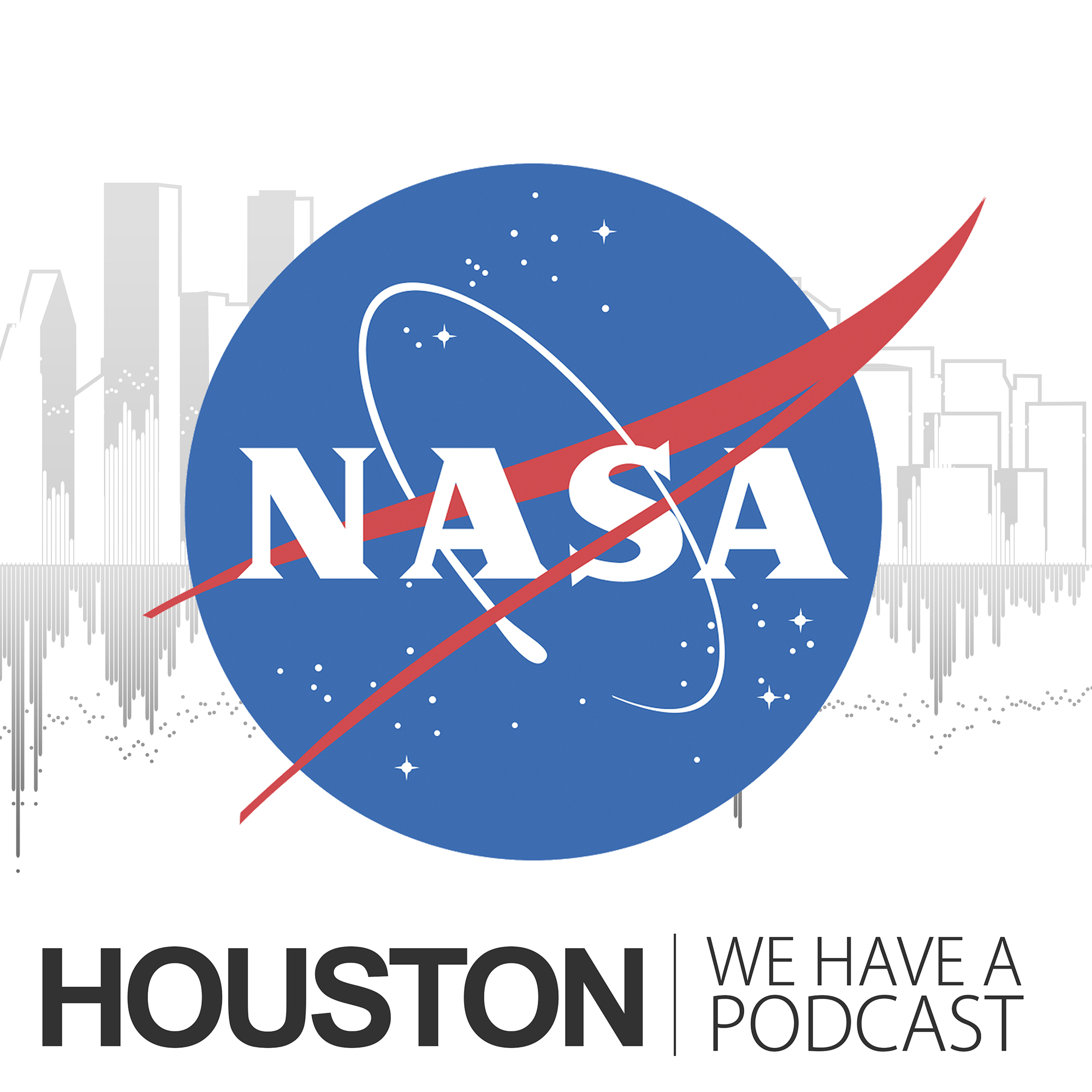
Transcript
Gary Jordan (Host): Houston, We Have A Podcast, welcome to the official podcast of the NASA Johnson Space Center, Episode 40, Tough and Competent. I’m Gary Jordan, and I’ll be your host today. So on this podcast, we bring in the experts, NASA astronauts, NASA flight directors, sometimes folks who have done both, and that happens to be our guest today. Today we’re talking with Colonel TJ Creamer. He’s a Flight Director in mission control Houston, and he also happened to be an astronaut before that. He’s the first and only person to do so. We had a great discussion about his story from his humble beginnings, all the way through his flight to the International Space Station. He talks about becoming a flight director, and the importance of what that means in mission control, especially leading a team of folks who, as Gene Kranz once said, are tough and competent. Applications to become a flight director just happen to be open right now, but not for much longer. If you’re thinking that working in mission control will be cool and you would describe yourself as tough and competent, this episode is especially for you. If not, don’t click away just yet, this was a really good conversation. You’ll enjoy it. So, with no further delay, let’s go lightspeed and jump right ahead to our talk with Colonel TJ Creamer.
Enjoy!
[ Music & Radio Transmissions ]
Host:TJ, thanks so much for coming on the podcast today!
TJ Creamer: You are most welcome.
Host: Awesome! I kind of wanted to start with your story, because it’s an interesting one, so I know you were born in Arizona, but you consider yourself more of a Maryland boy?
TJ Creamer: For the most part, I think that’s geographically probably the best. I’ve — in my lifetime, I’ve moved domiciles 23 times.
Host: Wow.
TJ Creamer: Dad was in the Army, I was in the Army, so add them up, you got bounced around quite a bit. Call me a citizen of the world, but I went to most of my schooling in the Maryland area.
Host: So, citizen of the world, so outside the U.S. too?
TJ Creamer: Oh, actually, yeah, I got a couple of years outside the U.S.
Host: Really? Okay, what countries?
TJ Creamer: I spent a grand total of six years in Germany.
Host: Alright.
TJ Creamer: And I’ve visited/slept in [inaudible] airport, touch and go, but have been, for some significant amount of time, in about 30 countries.
Host: Amazing! Wow! Yeah, I can’t say that [laughter], by any means. Alright, so growing up Maryland, what got you into space? What really influenced your path?
TJ Creamer: So, it’s kind of interesting in the sense that I didn’t have a plan, let me just tell you what kind of kicked things off. When you get a handful of years old enough in the Army, the Army goes, hey, you know what, we know your primary specialty is an aviator. But we want you to pick a secondary speciality, and so I said great. I was a chemist, as the undergraduate degree program provided me with that background. So I said, research and development, and the Army said, great, what we’ll do, and they did, they sent me a free subscription to RD&A magazine, Research, Development, and Acquisition. And the first issue I got, the inside back cover was an article entitled, Typical Profile of an Army Astronaut, and it wasn’t until that age, mid-20’s, that I went, oh! If they said brown eyes and brown hair, that would be me! [Gary chuckling] So I hadn’t really had thought about it until that moment, to be quite honest with you.
Host: Really?
TJ Creamer: And after that, we started tracking a little bit about improving one’s background and experiences to help with an application process.
Host: So then what got you into the chemistry field then, before — before you were even considering space?
TJ Creamer: [Laughing] So I did really well in high school, except for chemistry. So I went into chemistry, because I obviously was doing something wrong, and actually that’s how I became a chemistry major.
Host: Really? Usually it’s the opposite. Usually it’s like, I’m really good at that, that’s going to be my career. It’s the opposite. Interesting. Okay, so then, so you read this and you said, okay, space — space is an option for me. Is that when you started — is that when you joined the ROTC in the Army?
TJ Creamer: So, for college, I was a four year scholarship in ROTC, so I came in as an ROTC guy, as a freshman.
Host: Okay.
TJ Creamer: Got my commissioned at the end of the four years of — of college and went into the Army. Ended up going to flight school, and went off to deployment into Germany for a couple of years there. So, the aviation world is a natural introduction to aeronautical stuff, which leads you into other types of flying, perhaps, but it was just a nice, little marriage of both interests, and — and forward-thinking stuff.
Host: So after you got your degree in chemistry, you realized that space was an option. Okay, to get there, maybe becoming an aviator is the way to go?
TJ Creamer: Right, right.
Host: That was the logic?
TJ Creamer: Not — actually, at that age, it was more like, this is what I would like to do. I would like to go fly, and that’s kind of how that evolved.
Host: [Laughing] I did — I did Young Eagle’s Scout, I think when I was 17, I was like right up against the 18 where they were like, okay, you’re too old to fly, and Young Eagle’s was you can just go to the airport and they had like a free fly day where you can just talk to a pilot and say, hey I want to go up, and that was my only flight experience.
TJ Creamer: Why not? So, I do remember, when I was knee high to a grasshopper, Dad took us up, Dad was an aviator also, took us up for a family flight, and I was bitten by the flying the aviation bug at age 3. Basically.
Host: That’ll do it.
TJ Creamer: And that kind of hung in there and off I went.
Host: Alright! And then, so it seems like you moved up the ladder pretty quickly. You went to aviation school, and then become an Army — Army aviator, and you were just kind of all over the Army after that, right?
TJ Creamer: So, a lot of nice opportunities were presented. I — I was able to take advantage of them. So you mentioned flight school for sure, I got to go to the Germany and picked up a second language in German. Came back to the states after the tour of duty in Germany, and, umm, through a couple of programs at schools, got offered a command in the 82nd Airborne Division. And on the way there, went to jump school, and later went to jumpmaster school, and so opportunities were able to come along, part of the natural career progression for the Army officer.
Host: Was it just that , was it a — it was an opportunity, and you said, okay, yeah, that’s something I’m interested in? Did you get any push from…?
TJ Creamer: No, no. No real — no real push, to be honest with you. It was an opportunity [inaudible], it was the right op — window of opportunity that it was open, and I kind of jumped through it. The truth of the matter is, when you — when — throughout my career, I really didn’t have a plan for an end state to attain. I wasn’t going for a specific rank or a specific job necessarily, I just kept trying to pick the hard thing. When option came up, I went the harder route, because I always felt if I chose the easier route, I’d always be going, oh, well, maybe I could have done it. So I tried the harder stuff, and that’s — that’s how that kind of got me to some neat opportunities.
Host: Yeah. What was — what was the thing driving you to do — was it just the, no, I really want to challenge myself?
TJ Creamer: Yes! Largely. Very much so.
Host: Incredible [laughing]. It’s kind of the opposite of what — a lot of the things I hear, I mean, honestly, like, I was interested in — in film and — and — and production, and so I wanted to go to be a filmmaker, but I thought, well, there’s really no backup, you either make it or break it as a filmmaker, so a nice, like, medium route for me was marketing.
TJ Creamer: Oh, cool!
Host: And that’s — and that’s why I ended up choosing that one is, maybe a little bit opposite from your career path of choosing the harder route and say, you know what, it’s hard, but I’m going to try it, and if I break, then I break, but this was — I did the safe way.
TJ Creamer: My — my mom said if I ever fell in a river, she would tell the rescue forces to look upstream.
Host: [Laughing] I like that, that’s good. So then after — after, you know, your — you’re a pilot, you’re flying for the Army, you’re — you’re joining all different kinds of challenging things, jumpmaster, right? So — so then when did your master’s come to play?
TJ Creamer: I guess I was in my third year in — at Fort Bragg. The Army called and said, hey, you did really well on the GREs, are you still interested in going back to graduate school? And I said, yes, I am! I’d like to go for internet — networking security. And they said, well, we’d like you to go for physics. I said, okay, but I’d really like to go for networking security, that kind of stuff, and they said, well, we really need you in physics. And I said, well I’d really like to go back for networking security, that kind of stuff. And they said, we’ll pay for physics. I said, okay.
Host: [Laughing] So that’s why! Okay. So was it — what — what was the — what was the drive for the networking thing?
TJ Creamer: Oh, just — just an interest.
Host: Interest?
TJ Creamer: Yeah, exactly. The — and so, the Army sent me back to graduate school for a physics degree and — and I ended up going afterwards to West Point to be an assistant professor there to teach the cadets.
Host: Oh, how was teaching?
TJ Creamer: Oh, it was wonderful! Top notch cadre members to work side-by-side with, top notch future of America that we’re teaching. It was a really excellent job.
Host: Really? And you taught physics there?
TJ Creamer: Yeah, sure did.
Host: Okay. So, I know through these many different careers and — and opportunities that you keep saying, for in the Army, I know one of them was space operations officer, right? What was that all about?
TJ Creamer: So, you’re asking a question that is really a time-based answer. When — when I applied, the first time I applied, I didn’t get invited for an interview, but the Army detachment here liked the application itself. It was strong enough to — to reach some interesting folks who were taking a look at the next generation of astronauts.
Host: Oh, so — so you’re talking about applying to be an astronaut?
TJ Creamer: At the time, yes, so, what happened was I was teaching at West Pointe, a call came out for Army astronauts, which is the same thing — at the same time NASA’s putting out a call for astronauts.
Host: Okay.
TJ Creamer: So I asked if I could go apply, and they said, sure, go apply. So I applied. Once I got down here working as a support engineer, the military personnel system was wrestling with numbers, like we do all over the place. Do we have the right number of people here, do we have too many people, that kind of thing? And so we were looking to kind of classify the folks that are working down here at — in Houston as support engineers, and even for that matter, how to classify the astronauts. And at that time, space operations officer didn’t exist. The time I was here, we kind of evolved into it. We got the military personnel system to recognize a space operations officer as specialty, and that’s how that came about, just about the time I was — it was coming on board here.
Host: So this — so it was — it was while you were at NASA?
TJ Creamer: Yes. Exactly right.
Host: Interesting. So you eventually — so there’s a couple steps here where you went from Army to NASA, so — so what was the…?
TJ Creamer: I got asked to come down to serve.
TJ Creamer: Oh, you got asked, okay. And so I — PCS, we moved the house down here, and so I ended up basically with a three year tour of duty before my 1998 astronaut selection.
Host: Oh.
TJ Creamer: And it was during that time frame that we were undergoing negotiations with the Army for a speciality that involves space operations officers and could we get classified as space operations officers here so we don’t lose some of the — the occupational time, while — while you’re serving here to support NASA.
Host: So one of the things while you were at NASA was space shuttle vehicle integration test engineer, now you’re working in engineering. You got physics, you got chemistry, you got Army, so where did engineering come to play?
TJ Creamer: So, once I got down here, folks said, where would you like to work? And I said, I’d like to go work in as broad an environment as possible. Why? Well, as an aeroscout in the Army, I’m interfacing with a bunch of units left and right, up and down, all over the place, working with large units, liaising between them, or among them, and when I was here, I said, well, maybe I can do something akin to that. And so the vehicle integration test office is the place where folks were the hands and eyes and ears for the space shuttle crews, before they were going to launch, representing them at the engineering flow in KSC, getting the — the crew cockpit, the crew environment, ready for the crews to — to be coming on board. And so I got to work with a whole bunch of programmatic people at JSC, a whole bunch of engineering people at KSC, and we’re doing the liaising thing again all over the place.
Host: So it was that kind of team effort that you really kind of appreciated then?
TJ Creamer: Absolutely.
Host: So it seems like this — this IT, it keeps coming up, you — you really liked working in the IT room?
TJ Creamer: So, while I was here at JSC, the early years, it was pretty clear that the IT arena needed some help, and so I kind of volunteered my — the time that I had available to help that. It was, at the time when I arrived, the JSC CIO office was just standing up, prior to that time that it hadn’t happened. And so I got into many discussions with John — Jack Garman, and we started [inaudible] around, we started bouncing philosophical ideas, even technical, geeky stuff together, and because of that, ended up — getting involved with the agency IT arena. So it just kind of sprung up.
Host: So, is — this is kind of jumping back a little bit. I’m trying to figure out where the origin of the IT interest came, because I know you had — you had chemistry and — and it was things that were challenging to you, was this something that maybe you were — is easy to you, or something you were doing on the side?
TJ Creamer: Mostly on the side.
Host: Really?
TJ Creamer: Easy for me, and also of interest, in 1984, the Apple Macintosh came out and I actually bought an Apple Mac way back when, and it became pretty clear that they helped me in my career, to be honest with you, I could produce briefings and presentations that were not matched by anybody else, and so…
Host: Wow.
TJ Creamer:…because of the computer capabilities that I was able to take advantage of, I started getting more and more involved. Like, way back then, there was a big chasm between Macintosh and PC’s, and I was able to help bridge that gap so that the two computer systems could talk to each other.
Host: And that was part of that shuttle job, right?
TJ Creamer: Oh, that was actually way before that.
Host: Oh, that was before that.
TJ Creamer: But that’s where it started, and then I just kind of stuck with it because it was useful and fun.
Host: So — so how long were you doing this vehicle integration job until astronauts started…
TJ Creamer: Three years. I arrived in ’95, and — and I got selected in ’98.
Host: Okay.
TJ Creamer: So, for those three years, I was doing the vehicle integration stuff.
Host: So how was the application process then? Did you — how did that come up, and how — you know, the call, all that kind of stuff?
TJ Creamer: The call [chuckling]. The…call.
Host: The call.
TJ Creamer: So, periodically, NASA puts out a call for applications, and…
Host: Yeah.
TJ Creamer: And so, once again, I applied, and to be fair, being — working here for 3 years has been a three year interview, sort of, kind of. It’s not official like that, but — but you get notice, you get — can you play with and work well with others, are you a team member? That kind of thing, but the actual application process came out and I got asked to come interview, a week-long interview, just like any other interview. It makes up for the fact we’re talking about a job that takes you to space.
Host: So you weren’t nervous then?
TJ Creamer: No, not really. Not really. There is — there is this, at least back then, I don’t know what they’re doing right at the moment, but back then there was a one hour interview in front of a big board, and it’s a little bit anxiety producing, but if you just be yourself, that’s a good start.
Host: That’s how, honestly, I think if you’re more relaxed, that’s actually how I ended up getting, at least a co-op, I mean, it’s not as cool as a — as an astronaut, but I was standing in line with a bunch of aerospace engineer, and I look down at my shirt, and it said, business administration, on my patch, because I was a sophmore and I couldn’t declare a major yet. So it just said, business administration, like what am I doing here? Am I in the right line? I was like, you know what, what — what’s there to lose? What am I going to say? No. I mean, so I just — I just approached it exactly like you were saying, nervous, like, what am I going to lose? I was just myself and it worked out. So, that has benefits, and it has a benefit for you, you get selected as an astronaut, and they…
TJ Creamer: I was fortunate. I — I feel blessed in that regard, I also feel most appreciative that given the chance to represent the country and doing something for the national interest.
Host: Yeah. So, what were some of the first jobs you were doing? It seems like you — you had quite a — even after getting selected as an astronaut, you were kind of all over the place.
TJ Creamer: So, yeah, I just can’t — I can’t hold a job is what you’re really saying [Gary laughing]. The — the typical training and maturation of an astronaut. So you go through the basic systems, and, at the time, we were studying both shuttle and station systems. In preparation for a space mission. But aside from that, we’re also supporting ongoing missions, and we do that in a number of ways, if you take a look today, that we have a number of — of astronauts who are serving as capcom’s, and talking to the crews on board. Back during my maturation years, there were a variety of things going on. For instance, the IT thing enters again into the fray. In January of 2000, I get a call to go over to Russia and work with Russians to — to build a network from tip to toe on station. The Russians had a tiny, little network. At the time, the U.S. had a tiny, little network, and the — the plan was to have a unified network up and down all of station, and so I got sent over there to help that happen.
The IT background, the self-made IT background was very helpful in that regard. Other — other ways, Expedition Three, Frank Culbertson was the commander, and I got asked to be his ground persona, his crew support astronaut, and during that time frame, also got to engage and talked with the crew then also, like the capcom’s, so.
Host: So a lot of — a lot of teamwork going on here too. It seems like the interpersonal skills are pretty important in all of this.
TJ Creamer: We’re not individuals, by any means, we are definitely contributing to the team for the greater glory of the team because if we can’t do that, then we tend to not be successful. So, it’s important that we’re able to help the — the big picture.
Host: Was it this drive to continue to challenge yourself? That made you want to tackle all of these — all of these different jobs?
TJ Creamer: A little bit. So in each area, you kind of go work and I contribute, and then you — if you find the whole or find the item or the aspect that — that really needs some bolstering, some help, and you can go off and make that better, than it’s a contribution.
Host: So you, crew support, you’re — you’re working to connect Russian and — and NASA as an IT system?
TJ Creamer: Yeah, yeah.
Host: You also worked on hardware, robotics, you were over in Huntsville, how are all of those coming up?
TJ Creamer: So, it just turned out that there was an opportunity to go work in the robotics field, and so we were doing that in support of ongoing missions. So I did that for a number of, handful, two handfuls of months or whatever. The — you mentioned the — the Huntsville aspect of — of my development, my background. So when I was on board, I was involved in not only systems maintenance, but also doing research activities, and so I was able to talk with the folks from Huntsville to help them out with items for research, in fact, I put together a couple of the racks that hadn’t been put together yet so that they could do ground operation research, ground-based research using the facilities we have on board. So, now that I say that, once I got back, and we started doing the post-flight public relations tours and I got to know some of the folks in Huntsville.
I noticed that there was one of those little areas that could possibly be helped. And that the area that I’m talking about is the two operations teams, Huntsville and Houston, I — saw a way that we could possibly make it even better by — by increasing the sharing across the Mississippi River, the liaisoning across the Mississippi River, in terms of making things better or more efficient for crews on board. So, for instance, historically, the first decade of station was building, with a little bit of payload operations. Well, when I got up there, we went up to six crew people, as opposed to three — three person crews, and now the goal is to really maximize as much of the payload operations, the utilization of space station. We went from the era of construction of ISS to the era of using it, so hence the utilization, and I thought maybe if I’d go over to become a payload operations director, I can help blend the two communities, share a little bit of both sides of the river with — with the other side, and getting each other more attuned to the items, the aspects, the flavors that — that both operations, communities, were very sensitive to, or not aware of.
So if I can get the two communities talking together, sharing across the river, we could probably help do utilization even better.
Host: Huh. So from a high — from a high view, for those who don’t know the difference between maybe mission control here in Houston and the payload operations that are over in Huntsville, what are the responsibilities and relationships there?
TJ Creamer: So, point blank, the flight director is in charge of the overall integration of what happens on space station. The primary charges, of course, are the safety of the crew first, safety of the vehicle, and then using those and assuring those, we’re going to accomplish the mission objectives. In the payload operations world, their charge is to execute payload science, payload operations. And they coordinate with the Houston operation team for resources, for priorities, for actual execution during the day, and so with — with their focus on payload operations and Houston’s focus on largely the overall systemic support and the overall safety aspect of what’s going on, it was good to get the marriage between the two operational communities. And then, today, as we go forward, even 2010 when I was onboard, as we go forward, the real reason why we’re up there in space is to use space station.
So, increasing the fluency of the payload operations community, there efficacy, so we’re even more efficient onboard is a good thing.
Host: So, that kind of blends in nicely with your — your flight, your mission in 2010, you were a science officer, right? So it was — it was through this — was it through a little bit of that connection with understanding what Huntsville is doing, and…
TJ Creamer: Yes. I mean, it was a nice — it was a nice exposure.
Host: Right.
TJ Creamer: And post-flight, after your — after all the bows are tied with your flight. So you got the public relations tour, all the after actions, all that kind of stuff, now you go back into a support role, supporting ongoing missions, and I saw an opportunity here to — to go join our Huntsville friends and — and do payload ops.
Host: Okay, so what — what were some of the — going back to your mission, you know, you — you launched in Soyuz, so how — how was that? How was that whole experience?
TJ Creamer: The Soyuz launch was [pause] — was entertaining [laughter], was interesting, probably is the better word.
Host: Okay.
TJ Creamer: So imagine three guys who wear extra large shirts sitting in your bathtub. That’s about as much room as we got, right? And then the second thing I say is the actual launch itself, it’s liquid-fueled engines. It feels like an airliner taking off. It’s just that we accelerate for eight, eight and a half minutes. And the airliner doesn’t do that. But that sensation of being squished, smoothly squished into your seat, is what the — the sensation is like.
TJ Creamer: Okay, and then you spent a couple months on board, what were some of the top highlights from — from what you were doing? So we arrived December 23rd in 2009, so first highlight is Christmas! [Gary laughing] But at the end of January was when the first of three shuttles came up to visit us. And the first of three shuttles brought Node 3 and the Cupola, the seven window window to the world, so that’s pretty much a highlight there. Because you now get to — it’s — imagine a sauna, but a small, slightly small-ish sauna, you can immerse yourself basically going to this window, and — and view the world. And it’s really breathtaking. [Pause] One way to describe how breathtaking it is is a couple crew members who had never looked out of the cupola before, I brought one-on-one, just by ourselves. The cupola window, all seven of them, have shutters on them, that we can control on the inside.
So I would tell — tell the crew member to close their eyes and I’d open up the seven windows, and then say, open up your eyes, and every single time I did this, they cried. It is mindblowing, breathtaking, heart stopping, beautiful.
Host: What — what is the most beautiful part about it? Is it the — is it the perspective?
TJ Creamer: The perspective, the vista, the colors.
Host: The colors. [Laughing]
TJ Creamer: It’s just astounding. It is wonderfully beautiful.
Host: What were some of the first thoughts racing through your head whenever you first looked out the window?
TJ Creamer: More an aesthetic appreciation. The — the classic line, there are no borders when you look through the window, but really it’s the aesthetics. It — it is just humblingly [pause] soul-searchingly beautiful. Then you go, wow, I’m actually up here. And you can also see, you know, the thin — the thin, fingernail of air that keeps us alive around the earth’s surface, and you go, yeah, this is kind of humbling. This thing is huge, and I’m just here.
Host: Yeah, you’re just a small part of it.
TJ Creamer: But it’s beautiful.
Host: That’s part of that overview effect, I guess.
TJ Creamer: Absolutely, yes.
Host: You’re just looking down and you realize there’s so much — everything you know is — is right below you, right? So, it’s just humbling to think that you get that perspective. Very, very cool stuff. I think one of the — one of the coolest highlights, at least for me reading your bio for the station was this IT background is coming — it’s following you even up in space, and you’re improving the IT infrastructure of the station.
TJ Creamer: So we got lucky. We got kind of lucky at the end of January. So, way back when, in 2000, I helped write the requirements for IT from station and one of the things we had put in there was internet access. So 10 years later, I happened to be onboard, and we had been striving for — for about 8, 9 months, prior till I got — to me getting there, trying to make the connections work. Trying to make all the boxes in the chain to allow a safe connection to the internet all happen at once. And it wasn’t until one Saturday in January, 2 o’clock in the morning, I’m still fiddling, banging my head against the problem, and, poof, solved the problem. And I went looky there. So I look around, and there’s nobody awake, I can’t go up, look, we got it! So, I sent out the first tweet saying we’ve live [Gary laughing], because I didn’t no what else to do.
So, in the morning, to complete the story, in the morning, I tell the commander on board, and I go, hey, we were successful, I let the whole world know that we were successful, and he tells me that he was supposed to send out the first tweet, and I went, uh oh. So [laughter], and then, bless his heart, he immediately after that goes over and immediately sends his wife flowers, which I thought was kind of cool.
Host: Aww, that’s really cool. So you sent the first tweet from…
TJ Creamer: Yeah, I did.
Host: [Laughing] Well, that’s awesome! First tweet from space, connect — establishing the internet in — in — in space, that’s — that’s quite an accomplishment. So you got back down to earth, and what were — what were you starting to do after — you said there was this postflight public affairs stuff, you know, what — what were some of the things coming back?
TJ Creamer: Um, the — the national grind of the postflight mechanism was what drove my weeks, months, after that, plus the recovery, the typical, the postflight physical therapy recovery type stuff. But probably what’s more important is that leads into what do you do next? And that’s really — all the astronauts get back into the mode of supporting ongoing operations or future operations. And, at some point, it was like, well, maybe I can go over to Huntsville and become a payload ops director, and to learn about their environment, to help the communications with Houston, to meld the two communities together, to be even better for space station, and that’s what — that’s how that came about.
Host: So was that your introduction to operations? Was — was the Huntsville access?
TJ Creamer: So, during Expedition Three, I was on console as a capcom.
Host: Oh, okay, so you got capcom?
TJ Creamer: Yep. Despite that, I would argue that since the time I was commissioned and when — in flying, I’ve been doing real-time operations my entire life. So, that — that’s my take and that’s my argument, in terms of specific space operations. The payload — payload operations directorship was putting me on console, for sure.
Host: So you must have enjoyed it then, because, yeah, because eventually you — you’re talking about what’s next? Right? That’s — that element, and flight directing was apparently on the table, right, so?
TJ Creamer: It was, but it was a surprise unto itself.
Host: Really?
TJ Creamer: So, I was traveling to Huntsville for three and a half years doing the pod thing, and it was in March of I guess 2015, I guess it was, where it was my last trip to Huntsville. So I came back and I was beginning to work with landing recovery for Orion, then that community, and I was at my desk when the email came out, nine days after my last trip to Huntsville, nine days after my last trip, the email come out and — came out and said, hey, we’re accepting applications for flight directorship, and that’s when I looked skyward and I said, what do you really want me to do, Lord? [Laughter] Give me some sort of sign! So, and so I applied for the flight director.
Host: Okay. So it was — you took it as a sign that, okay, maybe this is my next step?
TJ Creamer: Yeah, so, in that respect, yes, but more to the point, I think it’s fair to say once you’ve been bitten by the real-time ops bug, and have been infected by the real-time ops, a virus, you don’t get rid of it. It — those folks who do real-time ops love real-time ops, and that’s the truth for my entire military and NASA career, that that’s the case. And so when this opportunity opened up like this, I went, shoot, man, that sounds like a natural calling.
Host: [Laughing] So you kind of alluded to the fact that the flight director is sort of the top dog, right? The top dog in terms of in charge of the International Space Station, integrating with not just mission control center in Huntsville, but other mission control.
TJ Creamer: So — so we got five centers across the world.
Host: Yeah.
TJ Creamer: We got, you know, the Japanese with their center in Tsukuba, and the Europeans with their center just outside of Munich and [inaudible]. And the Russians, and, of course, [inaudible]. So it is very much an international partnership that’s going on, and — and international collaboration, in order to make space station successful. Right now, the only vehicle we are currently flying is Space Station, but we also are working with our other partners, SpaceX, Sierra Nevada, Boeing, for the vehicles that are coming up yet, and we have flight directors who are intimately involved in coordinating with them, getting our products and our processes and our operational philosophies and ops concepts down in order to both be successful in their operations, but also to help them execute.
Host: So how’d you know that you were ready to take on that large responsibility?
TJ Creamer: Um, to become a flight director you mean?
Host: Yeah.
TJ Creamer: Well, first, I think it’s fair to say that with the life experience that I’ve had — or say it the other way, yeah, I’m old. So, the — with the life experience, but also the training that’s gone through both the military aspects, as well as the NASA operations aspects, knowing also that the flight director early program, once selected, you go through the training required to hone skills that it’s a matter of executing the training appropriately, and that’s what we’ve done throughout the career, whether it’s Army flying or astronaut flying or flight director.
Host: So once you apply, you had a couple interviews, how — how were those? What were some of the things they were asking you?
TJ Creamer: So, I think it’s very fair to say that the folks we are looking for for flight directors are folks who exhibit good leadership skills, have demonstrated the ability to have a good head on their shoulders, also the ability to see the battlefield, and I’m not talking about army battlefield, but in the metaphor, the battlefield — with all the smoke on the battlefield, to be able to see clearly, the way to approach the problems, the environment, to be able to identify the risks that we need to be focusing on, to mitigate and to manage. So, we’re looking for strong leadership skills, the ability to work with a multifaceted organization across the globe, we’re not just talking simple MCC, we’re talking multi organizations, many international partners, and you got to be able to see the big picture to be able to do this correctly.
Host: So, you knew that you had the leadership skills, you knew that you had — it seems like, I mean, from what you’ve said so far, you had so many different jobs, you were working with so many different teams, bringing people together, and that’s — I think a large part of flight directing is to make sure everyone’s on board, and…
TJ Creamer: You — you said that well. Yeah. So, the pillars of safety crew and safety vehicle in order to accomplish the mission objectives are what we live by. We have to identify the risks, we have to manage the risks, and we have to get the community to buy in to understand what it is we’re doing and how we’re doing it to make sure that we’re doing it correctly. You said, I knew I had leadership skills, I think it’s fair to say, I believe I have the leadership skills. Everyday when I walk in the control room, I’m still learning things, it’s not like I know everything, but the underlying principles of the leadership, the underlying principles of real-time execution in a high stress environment, they’re there, and we’re honing them everyday.
Host: So then transitioning from applying to be a flight director to actually being selected as a flight director, now you’re being trained as a flight director. How was — how was the first couple months of training?
TJ Creamer: So, a large portion of it is building the foundation so that everybody has the same awareness and exposure. So, for instance, in my class, we had somebody who was an OSO [phonetic], a guy working with the mechanical stuff and the tools. We had a spartan, a guy who really knew — knows the power system. Mary came from the cronus [phonetic] world, in the command and data handling and the communications and video environment onboard. So we had different backgrounds of folks in our class. So let’s — let’s build a foundation from which we can then spring forward. So we got a lot of academic training. So we get the opportunity to go to operational centers and see how they behave and how they operate, for instance, we talked to Goddard, we talked to White Sands, we went to Marshall Space Flight Center because they’re doing payload ops, to broaden our exposure and to see how we were all interfacing together.
Once you get that academic foundation, now you’re starting to exercise the real-time aspects of it, and we start going into SIMs. And we are training in simulations, not for a nominal day, we’re training for the Vince Lombardi moment, or Vince Lombardi told the — the football teams, you know, practices are really hard because we wanted to make the game fun. So when you go on the — on the gridiron for the game, you’re — you’re ready for whatever’s coming at you. In the similar sense, the SIMs that we’re doing are to exercise our prioritizations, our risk mitigations, be able to draw on the team members all around the world, to be able to make conscious decisions, to keep the crew safe, to keep the vehicle safe, and to accomplish whatever that day’s mission is. And when the — the very evil, SIM, you know, SIM overlords, the SIM sups, the, we call them CTOs, but the guys who designed the training environment throw at us the malfunctions, the purpose is to exercise our good practices for risk mitigation, risk management, and including all the aspects that we need to be aware of for prioritization the appropriate recovery aspects.
So when they throw the kitchen sink at us, often times, the kitchen sink is also broken, and we have to work how to — how to repair, how to get to a functioning standpoint where we can keep the crew safe, and begin repairing the vehicle.
Host: So how much of it is intimately knowing how to fix it versus intimately knowing who to talk to to get everyone together to fix it?
TJ Creamer: So I will — my — my prophecy, my — my view of the world is that there is no 100 percent answer. You gave me two options. I can’t say it’s 100 percent either case, in fact, it’s a blend of both of those options. A little bit of experience knowing how the ISS system is built, and choices and likelihoods for path and decisions, but it’s also relying upon the subject matter experts that we have in all the control centers around the world. The key thing is to be able to get the right person, to be able to offer up, at the right time with the right words so that the audience, the rest of the world, gets to hear that this is the solution path we should be going forward with. So a lot of the training that goes on in the SIMs is to get the subject matter experts who are — who are in training to become subject matter experts, and part of that is the soft skills of being able to convey the thoughts that are in their heads.
Host: They have to — if there’s a problem, they can’t keep it to themselves, they got to let everyone know.
TJ Creamer: And part of our job, as flight directors, is to flesh that out. Let’s see if we can’t get to the nuts and bolts of what you really are thinking and where the problems are so that we can get the right decisions on the table.
Host: So it seems like a lot of the job is, at the very least, asking the right questions?
TJ Creamer: Yes. The right question [Gary chuckling] — questions are a very, very powerful tool, I agree with you.
Host: So then what’s the — you sat in as a capcom, you sat in Huntsville, and now you’re sitting as flight director. What are some of the main differences how you approach sitting in a room based on the job that your — that you have?
TJ Creamer: The best answer is, whenever you’re working on a team, you have to understand the function that you’re fulfilling on the team so that you can contribute for the greater betterment of the team. So, as a pod, for instance, I knew that I was contributing in the payload operations arena utilization activities, but also helping the flight director understand the prioritization, and how much crew time am I going to need to fix this problem now? So, if I’m asking for resources from the greater global team, I should be able to express that as a payload operations director. In a similar sense, as a flight director, now I’m asking people to speak to me in the inverse, speak to me in the terms of what they need, where the program’s priorities fit in the overall decision matrix, and, of course, we are doing this negotiation, this exploration of options all under the umbrella of keeping everybody safe on board and keeping the vehicle safe.
So, you asked me, how’s it differ? I’m now looking for the inputs from the team, I’m trying to solicit the inputs, I’m trying to enable people to be able to give us the right nuggets of information so that we can execute.
Host: So it’s a little bit of them giving you the information, but then also making sure that you’re empowering the team, to make sure that everyone’s talking, but now you have, as a flight director, this higher thought that’s, okay, number one, safety, both of the crew and then of the vehicle itself. No matter what decision is happening, those are the top two considerations that you always have in the back of your mind?
TJ Creamer: Both when I was onboard, I knew the team was doing this. Now on the ground, with the people onboard, I know that they’re relying upon us to keep them safe and keep the vehicle safe. Absolutely. They — the key thing that we’ve left off from this discussion of gaining the information from folks, as well as enabling folks to give us the information is also to come back and go, now that we’ve got a lot of smoke on the battlefield, it’s very confusing, the clarity we’re going to achieve here is, we’re going to go off in the northeast direction, as opposed to southerly direction. To add clarity to the — the team, worldwide, the team’s effort, we’re in a situation now, the path through these woods is in often this direction, come follow me, we’re going to go off and solve the problem in this direction. So, in much confusion, it is very important to be able to give clear goal attaining descriptions of what we’re going to do next.
Host: That’s right, because each position is sort of responsible, like the thermal guy is going to say, well, you know, this is — based on my perspective, this is where we need to go, the — I don’t know, the — what’s the ethos console? Yeah, life support, life support is going to say this, and then the inventory guy is going to say that, so, sure, you have to — I — that makes sense. So everyone’s going to put in their input based on the perspective that they have. Okay, let’s — let’s take a break, go into this direction, what are the next steps?
TJ Creamer: And the better the flight controllers around the world are those who can — can stand up a little bit taller and see the bigger picture. Flight director is going to need to be able to do that with great clarity to be able to bring everybody along with them.
Host: Definitely leadership skills are among probably the top, and then also communication team building efforts, I can absolutely see it. So how did you — how were you trained to — to really know the potential of what you could accomplish in this role, were you shadowing other flight directors? It seems like you were traveling and getting a broad perspective of things too.
TJ Creamer: I — I think what you just said is a good summary. If I step back a little bit and go, how were we — how were we trained in order to get to the flight director world, I have to simply say, the life experiences, the job responsibilities, that have led up to the actual application is what has been the majority of the leadership skill training. When you get into the flight director office, we’re now honing those skills specifically for the — the space operation execution, mission office.
Host: Okay. So, yeah, it’s more of the tactical approach, right, you already — you already know, you’ve already shown that you have leadership skills, here’s how you apply it to flight director?
TJ Creamer: Exactly. And we’re — we’re honing those throughout the SIMs, we’re honing those through the precertification training phases for the flight directors, and now we’re hoping and helping flight controllers as we are going forward in our simulations to also do that in their own disciplines for the greater team around the world.
Host: So in — in these SIMs, simulations, you — they simulate a — some sort of, not a normal day, but like you were saying, they simulate something going wrong, and you have to fix it. What was — does a moment stick out in you of some failure going wrong, and you’re like, maybe you had some hesitation or maybe you knew exactly what to do, maybe like a highlight in one of your SIMs?
TJ Creamer: Off the top of my head, I — we’ve done so many SIMs. We’ve gotten so many problems [Gary laughing], and the dynamics, at the time, was there another failure upstream that we’re now adding a failure that’s complicated [phonetic]? I can’t give you the specific examples.
Host: Okay.
TJ Creamer: However, the question that you do ask, yes, often times, not all the time, but, often times, you go, wow, okay, I know how to deal with that malfunction. But what needs to be flushed out is that earlier in the SIM, you know, hours ago, something else was slightly off. For instance, a computer card is no longer communicating on the network, it’s not being able — you can’t send commands for that computer guard. And, guess what? The command you need to send to fix that one malfunction has to go through that now no longer playing computer card. So — so it adds a twist to it, and people have to be able to realize that the — the easy solution path is not always the one that’s available to you. So you have to make other approaches to solving the problem, or you begin to prioritize what it is you can deal without.
Host: Okay. Do you often think back to the Apollo days? Whenever you’re sitting in mission control, as a flight director, and — and consider some of the lessons from some of the greatest, Chris Kraft, Gene Kranz, Glenn, like those guys, do you ever — do you ever think back on…?
TJ Creamer: So, we have the pleasure and the opportunity to talk with those folks. They come — they come occasionally to — to speak with us. We have socials that we include some of the — the honor roll giants from our past to be able to speak with them, and — and it’s a large learning point for us. When our class gave the — the flight director community a welcoming party, the new guy’s giving the welcoming party, the older generation of flight directors did come and — and join in on the celebration. And they were telling stories. And later, as the night wore on, everybody was sitting at the knees of — of the giants, listening to their war stories. It — make no mistake, it is a national important point in our history from which the rest of this space program has sprung, and we are executing the national will, the national intent for exploration, and it’s because the — the giants that existed conquered basically the unknown and set the template for us that we’re now — we’re standing on the shoulders of the giants, don’t get me wrong.
So, part of the reflection that you’re alluding to is not only in difference to them and learning from them, but also because we have the responsibility to carry on what they started.
Host: So then maybe — maybe it’s from them, or maybe it’s something that you, yourself, take to mission control with you everyday, if you’re — if you’re sitting and your shift is now beginning and you sit down, what are some of the thoughts that run through your head, that say, okay, I’m ready to do this, I’m ready to start this shift.
TJ Creamer: So there is this bit of an edge that you get. The edge that I’m talking about is to be able to be razor shape in the thinking process so that you don’t make mistakes. We are in a business that isn’t 100 percent safe. And we don’t have the ability or the luxury to fail. But at the same time, we have to recognize that there are risks that we have to take in order to be successful, and so now, the onus, this responsibility that we have is to be able to identify those risks, manage them to a reasonable level so that we’re not doing something willy, nilly, offhandish, sloppy, and to mitigate the risk to be able to keep the crew and the vehicle safe. So that edge that I’m talking about is everytime you step in that room, the ultimate consequence is possible.
And it is incumbent upon us to recognize that responsibility and drive forward smartly. That’s the edge I’m talking about.
Host: So you approach everyday seriously, very seriously? Because the stakes are high.
TJ Creamer: The stakes are very high.
Host: You say we’re standing on the shoulders of these giants that — that sort of wrote the template, as you said, and we’re, right now, we’re, like you said, the vehicle that we’re operating is the International Space Station, and — and we’ve built the lessons from the Apollo days, going through shuttle, down to space station, you know, we’ve learned a lot, but there’s this whole new era coming up, right, of — of deep space exploration. What are some of the things you’re looking forward to from — from mission control in some of this exploration phase?
TJ Creamer: So we can very easily get into the philosophical world which starts with, you know, a ship is always safest in its harbor, but it’s not why we build ships. So, we do want to go farther, we want to go farther for a number of reasons. We want to go farther to extend life elsewhere, to make life better here, for people who are staying here, and to learn. As we go and — and beat the problems, conquer the difficulties in order to extend life elsewhere, we have automatic benefits coming back to the folks on the earth. And that — the whole spin off, the NASA spin off, series of — of almanacs we put out yearly, expound upon this, but the — the smoke detectors in the homes, the miniaturization for — for watches and — and smartphones, all are coming from space drivers. The heart pumps that we’re dealing with as a result of what we’ve done in our space program.
So, there are spin-offs all — all over the place. So there’s some natural benefits for conquering these problems we have to solve. There are spin-offs, people on earth benefit. Life improves here. The very same technology we’re using on board right now for water recycling, we take that capability and go to third world countries to provide clean water, or we go to a disaster to — to provide clean water. What we do on space station is helping us get a little bit farther away, and now we take the — the species to another rock in the solar system. And why do I say it that way? Because right now we got all our eggs in one basket, and having eggs all in one basket is not a good thing, just ask the dinosaurs. And so I’ve gone off into my little philosophical diatribe there because of the question that you ask, although it also explains what we’re looking forward to, to finding out new things, to be able to get farther away, to be able to do the missions that exist around the — the — our moon, to be able to extend farther to Mars and go, well, why did it lose its atmosphere?
We’ve seen evidence of water in every place we’ve found water so far, we’ve found life. So, there’s a lot to learn and that’s what we’re looking forward to.
Host: Yeah, and, like you said, take it back down to earth too. You know, understanding the impacts out in the solar system, you can take these technologies right back down home, and put them into our watches.
TJ Creamer: Exactly right.
Host: [Chuckling] So I kind of wanted to blend in, that would have been a nice place to really wrap things up [laughter], with a philosophical thing, but I really wanted to talk about this application to become a flight director, you said, you — there was a time where an application opened up and you applied, that’s happening right now.
TJ Creamer: It is. It is, indeed. And so, just for the podcast itself, in case people listen too late, the — the application process closes on the 17th.
Host: April 17th.
TJ Creamer: April 17th, exactly right. And so we’re hoping that folks are able to take advantage of the open window that currently exists right now. If folks have questions or queries, or want to learn more about what it’s like to be a flight director, there is a book that’s becoming available.
Host: Oh, cool.
TJ Creamer: And the title of the book is, The ISS: Operating on — Operating and Outpost in the New Frontier, and the idea is that this is — this book looks at the operations of the International Space Station from the perspective of Houston flight control team, and so because of that, if folks are interested and want to take a look at The ISS: Operating and Outpost in the New Frontier, it’s available, or will be available, on nasa.gov/ebooks.
Host: On the 16th.
TJ Creamer: On the 16th. So, hurry up, read it, and apply!
Host: [Laughing] If you’re listening to this as soon as it comes out, then, yeah, you know, you’ll have to wait a couple of days, but if you’re, even day after, you can go and look it up, and we’ll — we’ll share the link to that after the end of the episode. So for those who want to, who think they have, you know, who think they are tough and competent, who are — who can follow in the footsteps of some of the giants, and — and sit in mission control, what are some of the tips that you did to — when you applied, but then also to understand that you are ready for this job?
TJ Creamer: So, in broad strokes, we’re looking for folks who can handle a fast-paced, high stress environment, where critical decisions can be made. We’re also looking for folks who have demonstrated solid leadership capabilities, principles, practices, and have the ability to work across broad spectrum of folks, not just organizations, but different countries. The purpose of this job is to uphold the responsibility that we’ve — we’ve sworn to of protecting the crew, whatever vehicle you’re on, protecting the vehicle, whichever vehicle it is, in order to make these missions successful. So, as you go forward and apply, you want to be able to demonstrate, and it’s not a bad thing to sell yourself in this regard, but to be able to demonstrate the leadership capabilities and how you’re able to prioritize and how you’re able to work with others, and how you’re able to make critical decisions.
Host: Okay, so what if — so for those who are not in the flight operations world, what can you say that can make them feel like maybe — maybe they’re ready even though they haven’t sat in mission control before?
TJ Creamer: So, some of this is — is a life experience question there, but it’s also a facet of life, meaning if you close your eyes and you imagine areas to be working in that kind of fit those parameters, some things, you know, jump out at you immediately. There are — are first responders, for instance, who are making critical life saving decisions in a heartbeat, no pun intended, but there’s a high stress — there’s a high stress environment where critical decisions are being made. If you go to the — the military arena, where there are some direct parallels in some of their specific operations that are also directly applicable, and I’m not trying to exclude any occupational area at all, but it doesn’t have to be flight operations specifically, growing up and staying in the same pipeline that we’ve grown up for over the years, in fact, this year, we’ve done an internal NASA [inaudible] for flight director applications, and we’ve done an external one so that anybody in the U.S. who feels that they can meet their — the descriptions we’ve talked about about the responsibilities and the capabilities can apply, and we’re interested in bringing in the good people, good heads, good leadership capabilities, that can make critical decisions in critical time-crunched bits of time.
Host: There you go. And we’ll advertise some of those links again at the end here, but, TJ, thank you so much for coming on and sharing your story. This is — it’s quite a story that you have, but then also just sort of understanding the responsibility of being a flight director. Especially now, this is a good time for it [inaudible] application window.
TJ Creamer: Absolutely. I agree with you.
Host: Really appreciate your time, thank you!
TJ Creamer: Thank you, sir!
[ Music & Radio Transmissions ]
Host: Hey, thanks for sticking around! So, as promised, I’m going to give you the magic link to apply to be a flight director. It’s pretty simple. It’s go.nasa.gov/flightdirector. You can go there and learn what it takes to be a flight director, and then actually apply. If you want to learn more about what it takes, they actually have a brand new blog post that just posted on nasa.tumblr.com. It’s called, Five Myths About Becoming a Flight Director. Colonel Creamer also talked about this flight director’s book. That will be posted on April 16th, www.nasa.gov/ebooks. It’s called, The ISS: Operating and Outpost in the New Frontier. And you can learn about what it takes and — to work in mission control, and then everything about it. If you want to learn more about what’s going on at NASA, there are two other podcasts that you can listen to. One is called, Gravity Assist, hosted by Dr. Jim Green, that talks about planetary science, otherwise, you can listen to NASA in Silicon Valley, that’s from our friends over at the Ames Research Center that talk about some of the research that goes on on the International Space Station.
If you want more information about the space station specifically, nasa.gov/iss is a great place for that. Otherwise, you can join the conversation on social media, we’re on Facebook, Twitter, and Instagram under as, The International Space Station, you can go to anyone of those accounts and use the hashtag AskNasa on your favorite platform to submit an idea, and we’ll make sure to either answer it on a future episode or dedicate an entire episode to it, just make sure to mention it’s for, Houston, We Have A Podcast. This episode was recorded on March 29th, 2018, thanks to Alex Perryman, Greg Wiseman, Pat Ryan, Brandy Dean, and the flight directors in our flight operations directorate for helping to put this episode together so quickly! Thanks again to Colonel TJ Creamer for coming on the show! We’ll be back next week!


